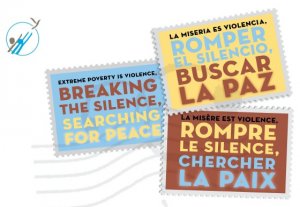Speech by Moïse Compaoré Member of ATD Fourth World Burkina Faso.

Opening plenary. Colloquium:” Extreme poverty is Violence. Breaking the Silence. Searching for Peace” at UNESCO House. 26th January 2012
I’m going to tell you the story of an old woman who lived by begging next to the great mosque in the town centre.
Together with some friends, we thought we should do something because, alone, she was taking care of her two grandchildren who accompanied her everywhere. We started to help her build her house nearly 8 kilometres (5 miles) from the town centre.
We wanted to get her off the streets. We gave her a small business: we set up the project, gave her money and she started to sell vegetables in front of her house.
Alongside this, we started literacy classes in her courtyard for her grandchildren and the neighbourhood children who wanted them.
We became aware that the old lady was becoming more and more sad and anxious. Out of consideration for us, she could no longer go to the great mosque and she finally told us that here, she was left to herself. ’People look at me funny and others even refuse to buy what I sell. At the mosque, people respected me, they used to talk to me when they have a problem. Here, nobody holds me in high regard.’
Eventually we had to face the facts: old Anne-Marie didn’t want the life we had offered her. It was us who had thought out the project for her and it was doomed to failure. We didn’t take the time to think with her about the most appropriate ways for her to cope.
We realised that at the mosque, she was acknowledged, she had become a grandmother to the children living on the streets. She cared for the sick, handled disputes.
Faced with poverty, you feel outraged and shocked. You seek solutions. But we’re not responsible for finding solutions for the man who lives in poverty. We have to be able to hold back, leave our certainties and together with them, find the solution. If you don’t, you might create dependency.
At the seminar at Dakar, someone said, ’we have organisations working behind us here, which bring lots of money, which bring lots of things, lots of things but it’s nothing. They are unable to fight extreme poverty because they don’t know to whom they should give the things they bring. They contact the most intelligent, they divide, they commit violence. They come and give rice to someone for six months but they don’t call at the poorest, most deserving person’s. That’s violence. This way of acting divides people.’
Throughout our exchanges at this Colloquium, I’ve understood the necessity of acting together. And to do this, we have to take the time to listen to each other, to know each other well and to understand each other. Without this active research together where everyone shares, we progress whilst leaving people behind us. One of us said, ’when I have to thank someone because they are helping me, the project isn’t appropriate’. And even that is a violence that we commit against those who we claim to support.

